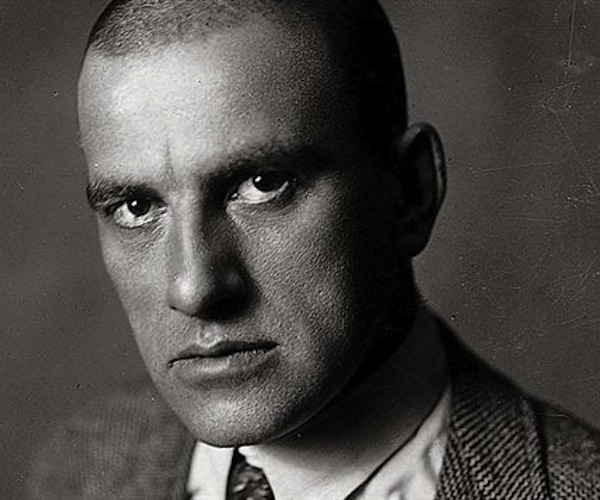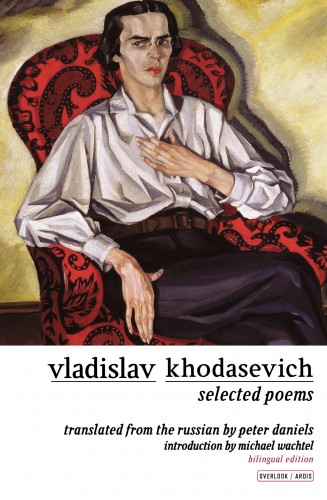Poetry Review: Translations of Two Wild Russian Poets, Their Flair Restored
New translations of Soviet-era poets Vladimir Mayakovsky and Vladislav Khodasevich ask us to recognize their enduring power and to restore them to their rightful places in Russian and international literature.
Selected Poems by Vladimir Mayakovsky. Translated from the Russian by James H. McGavran III. Nortwestern University Press, 404 pages, $19.95.
Selected Poems by Vladislav Khodasevich. Translated from the Russian by Peter Daniels. Overlook/Ardis, 192 pages, $27.95.
By Jim Kates
“… We are deciding what name to use as a password, how to call out to one another in the gathering gloom,” V. F. Khodasevich. Tr. Stephanie Sandler.
They stand at opposite poles of their generation of Russian poetry. Over an eponymous square in Moscow looms a monumental statue of a rubber-lipped civilian, a pen in his vest-pocket, his left hand drawing back his coat-tail as if ready for a quick-draw shoot-out. This is Vladimir Vladimirovich Mayakovsky, born in 1893, dead by his own hand in 1930. As far as I know, there is no public monument to Vladislav Felitsianovich Khodasevich (1886-1939), but he flits as a fictional ghost (Koncheyev) through the last novel Vladimir Nabokov wrote in his native tongue, The Gift, which includes an émigré destined to fall out of the canon by his absolute rejection of the Soviet experiment, just as Mayakovsky was dismissed from the canon because the embraced.
And now we have two new translations of these poets, asking us to recognize their enduring power and to restore them to their rightful places in Russian and international literature—Selected Poems of Vladimir Mayakovsky, edited and put into English by James H. McGavran III; and Selected Poems of Vladislav Khodasevich, chosen and translated by Peter Daniels. The two compilers also tend toward different poles of translation, although these are still poles on the same planet. McGavran takes us on an academic journey. Daniels is a poet translating another poet.
Poor Mayakovsky! Dismissed by some as more of a banner than a poet because of his rough inclinations and savage support of a murderous tyrant, his Cossack classlessness has been outclassed by his own more subtle contemporaries. He has become a little like Heathcliff roaming the moors of belles lettres, crying into the night. Born in 1893, he embraced revolutionary ideals early, and became one of the leading lights of Russian Futurism. He declared himself the hero of his own story. In an article on Mayakovsky’s laughter, McGavran claims that “The poet’s tendency to merge with his characters and surroundings . . . makes him an ideal opponent to public, adult laughter, which requires some measure of detachment and assumed superiority.” There is always something gee-whiz! in Mayakovsky’s poetry, even where he is at his most superior, trying to fly over the heads of the rabble, the pharmacists and philistines. He rode the whirlwind of the Revolution, supporting the new Soviet state with unabashed propaganda, and may or may not have lost himself in it. His suicide note was a stoic appeal to his public comrades and his private loves: “Don’t think me cowardly. Seriously — it can’t be helped.”
What characterizes Mayakovsky’s poetry most is its wild energy. When he loses that ferocity, the pieces degenerate into parodies of themselves and Bolshevist rhetoric. What may be less apparent is a fierce internal discipline that fuels the energy.
If only I were
small,
like the Pacific Ocean—
I’d stand on the waves’ tiptoes,
snuggle up to the moon on the tide.
Where am I to find a beloved,
on who’s like me?
She wouldn’t fit in the tiny sky!
McGavran’s translation is admirably sensitive to what he calls “shifts in style and attitude,” and the poet’s sometimes spectacular innovations in language. But he tends to be at its weakest in his rendition of more formal rhythms and rhymes (“noggin” / “doggie” being one of the lamer efforts.) McGavran can also trap himself when he hews too close to the original language. For example, a “ptichka” is literally a “birdie,” but the diminutive is used so casually in Russian that it does not suggest the coy baby-talk of the English connotation. The word would have been better translated as “bird” or, at most, “little bird.” But still, this collection, especially with its presentation of the wide range of Mayakovsky’s poetic career, is valuable, and its accessible notes, in which McGavran provides much of what left out of the actual text, are informative.
Peter Daniels is a poet, not a scholar. I have liked his translations of Khodasevich so much that I wanted to publish them myself, and I am more than pleased to endorse the Angel/Overlook/Ardis edition of this selection. It is long overdue, and the addition of Michael Wachtel’s introduction makes the book even more to be prized — and read.
Khodasevich, sickly all his life, began to publish his poems in 1908. He wrote in blank verse along with stricter verse forms, just like his predecessor Pushkin; Khodasevich left the Soviet Union in 1922, moved to Berlin and then to Paris in 1925, and died of cancer just before the Second World War. In his later years, he turned more and more to writing incisive prose. Wachtel quotes Nina Berberova, the writer with whom he shared his years of wandering, “He stopped writing verse because there was no one with whom and for whom he could continue.” Respected by his contemporaries, never identified with a specific program or a school of poetry, he lived in the nowhere land of emigration, to the point that his verse fell into obscurity except among other Russian poets. Now Daniels has given English-language readers a generous selection of his relatively modest body of his verse in a bilingual edition. A modest body it is, but it exudes an incredible strength as well as a bracingly humane observation of the world. If you haven’t read Khodasevich’s 1919 poem “Monkey,” you haven’t yet read twentieth century poetry:
I have shaken hands with beauties, poets,
leaders of nations—not one hand displayed
a line of such nobility! Not one hand
has ever touched my hand so like a brother’s!
. . .
That was the day of the declaration of war.
Daniels has kept as close as possible to Khodasevich’s form, but not with a heavy hand, and the effect can be Auden-like — which is not at all inappropriate:
Silently, frost on the window
grows palm-trees and icy white flowers;
my watch ticks away in my waistcoat,
metallically counting the hours.
But more often the voice is unique:
have made a mess all day upon the waters.But now above the lake there’s rain and dark,
and from the grass a green amphibian croak.
The versions often catch the cadence and sound-play of the original Russian, which a reader can refer to easily on the left-hand page. As a translator myself of Berberova’s poetry, I have from time to time tried my own hand at a Khodasevich poem, always to turn back, defeated. I appreciate all the more what Daniels has accomplished.
Daniels’ translation of Khodasevich’s work stands as evidence that time, working with a good editor, occasionally can retrieve what might have been lost in the harsh climate of contemporary disturbances and disruptions. McGavran’s rendition of Mayakovsky’s poetry demonstrates the discoveries that can be made when figures we thought we knew all too well are given a thoughtful closer look.
Some say Peter, some say Paul. When it comes to deciding which poet’s name to use as a ‘password,’ readers will no doubt have their preferences, given the contrasting styles of poetry and approaches to translation represented by these books. As for me, I am more than happy to embrace both.
Jim Kates is a poet, feature journalist and reviewer, literary translator and the president and co-director of Zephyr Press, a non-profit press that focuses on contemporary works in translation from Russia, Eastern Europe and Asia.
Tagged: James H. McGavran III, Peter Daniels, Russian poetry, Vladimir Mayakovsky, translation


